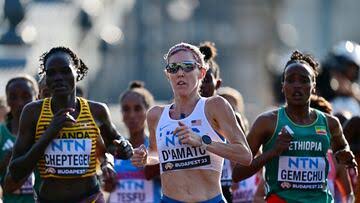
This one reason is why Olympian Rebecca Cheptegei Ex-boyfriend set her on fire – According to report
Rebecca Cheptegei was a competitor in the women’s marathon at the Paris Olympics last month. She died on Thursday as a result of domestic abuse. Long-distance Ugandan runner Cheptegei passed away in a Kenyan hospital following her being doused in gasoline and set ablaze by the man she was seeing, Dickson Ndiema. Hayat Bearat, an interim director of the Domestic Violence Institute at Northeastern University and a visiting associate professor of law, described the situation as “devastating on so many levels.” It demonstrates just how much domestic abuse impacts each and every individual. Domestic abuse can claim the life of an Olympian athlete as well.
According to news reports, Cheptegei is the third elite female runner who is suspected of being killed by a lover in the past three years. After Agnes Tirop, a Kenyan runner, was discovered dead in her house in 2021, her husband, Ibrahim Rotich, was accused of her murder. Another runner, Damaris Mutua, was found dead from strangulation later that year; her boyfriend, who has not been located, is the primary suspect, according to the police.
According to Bearat, it’s common for physical abuse to start or worsen when one partner becomes well-known and the other gets envious. According to Bearat, “when someone succeeds and forges a career for themselves, the abuser feels like they can no longer control them.” Thus, they become physically aggressive. Domestic abusers might attempt to control a victim in a number of ways, and there is a wheel of power and control involved. They might achieve this by turning up the aggression. Cheptegei’s death, on a broader scale, is a part of a pattern in African countries known as femicide—the killing of women and girls. With at least 20,000 gender-related killings in 2022, Africa overtook Asia as the region with the highest number of these deaths.
Bearat said these acts often fall under the umbrella of domestic violence as it’s common for the perpetrator to have a relationship with the victim.
According to experts, a portion of this can be attributed to African cultural traditions. Leaders minimize the issue because women and girls are often seen as expendable. After a confrontation over property, Cheptegei’s father said he called the police personally to report Ndiema harassing his daughter, but the officers “took the matter for granted.” According to Bearat, gender-based violence is the most serious human rights violation against women worldwide, but it’s most common in areas without laws that make those particular behaviors illegal. For instance, marital rape and “honor killings” are still legal in several Asian and African nations. Bearat stated that even if these rules are finally repealed, they may still shield family members who hurt female relatives.
Bearat stated, “There are these justifications for these actions in society.” “There needs to be societal norms and an existing legal framework for it to end. The laws are only so effective if they prohibit something, but society standards dictate that you can still do XYZ. Bearat continued by saying that it’s also typical for authorities to take no action on reports until there has been actual physical harm. Usually by then, it’s too late. “It’s a major issue everywhere,” she remarked. I can speak from experience working here in the United States when I say that when survivors call the police, they may get no response at all or they may be told to wait till they do.
Read more on sportchannel.co.uk
Leave a Reply